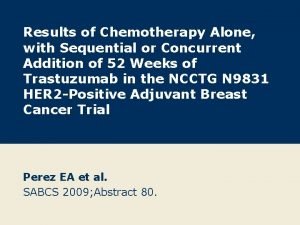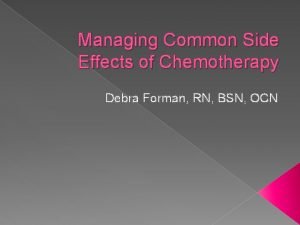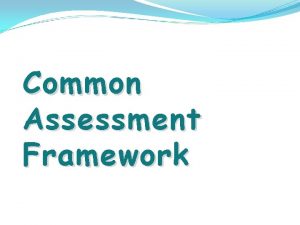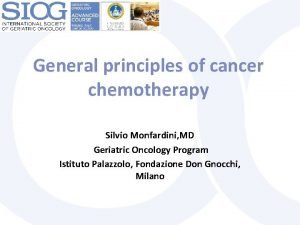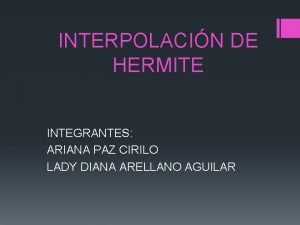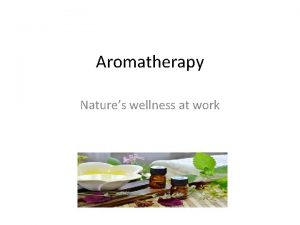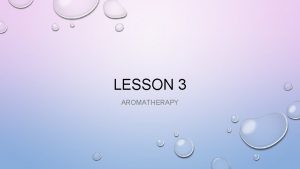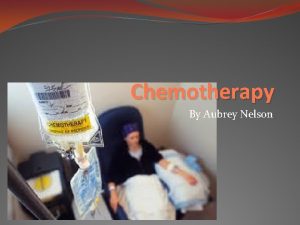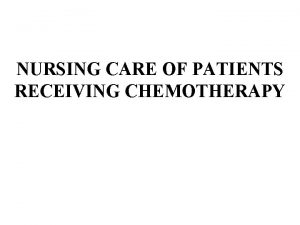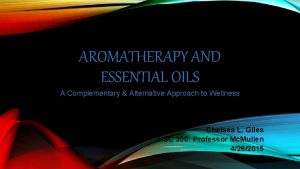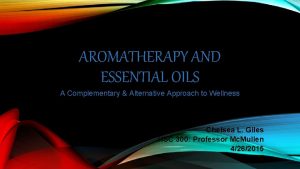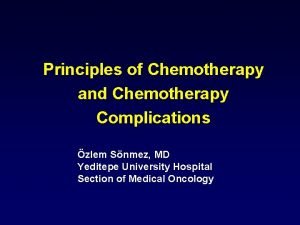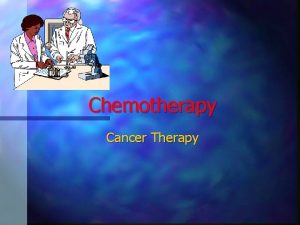Essential Oil Aromatherapy in Patients Undergoing Chemotherapy Ariana















- Slides: 15

Essential Oil Aromatherapy in Patients Undergoing Chemotherapy Ariana Smith Pedraza, BSN, RN Nursing 5382. 060 Spring 2021

Acknowledgments I want to first take the time to thank God for allowing me to get to this point in my education and for blessing my husband me with the child I am carrying. I want to thank my husband parents for being my support system throughout my MSN journey and for the continual encouragement. I want to also thank all of my professors who have helped and supported me on this journey and who have been more than available to assist with any questions I had. Please take this time to review my presentation.

professionals on the ethicality of some of the common drugs used in addressing the side effects of chemotherapy in the outpatient setting Rationale • To raise the concern to patients on whether or not they are truly being presented with options about their care and whether these options are being explained to them in understandable terms • To promote an approach to care that incorporates caring for the patient as a whole, a holistic approach rather than as a set of

Goals • Educating healthcare professionals on the usage and effectiveness of essential oils in everyday use • Collaborating with nursing leadership in incorporating future plans for essential oil usage in practice • Future goal • Evaluating the effectiveness of essential oil aromatherapy usage in addressing the side effects of chemotherapy in the

Literature Synthesis • Lavender oil significantly improves sleep quality and anxiety in patients undergoing chemotherapy (Ozkaraman et al. , 2018). • Lavender oil patches significantly improve anxiety and sleep quality in cancer patients (Shady et al. , 2019). • Ginger essential oil significantly improves nausea and vomiting in patients undergoing chemotherapy (Lua et al. , 2015). • Peppermint oil combined with conventional antiemetics significantly decreases the incidence of nausea and vomiting in patients undergoing chemotherapy (Erurk & Tusci, 2021) and

• Nursing leadership • Chief Nursing Officer/Associate Chief Nursing Officer • CEO • Oncology Clinic Manager Project Stakeholders • Clinical Staff • Registered Nurses • Licensed Vocational Nurses • Unlicensed Assistive Personnel • Pharmacy staff • Providers • Medical director • Mid-level providers • Covering physicians • Patients

first trial for four weeks, an assessment period of one week after that to examine processes and make necessary changes, and another four-week phase for moderate to higher-acuity patients Implementation • Four oils will be used during the trial with a symptom burden scale to assess for the presence of symptom burden (nausea, pain, anxiety, depression), which will be reassessed at specified intervals throughout therapy session and re-evaluated at the end • This will determine whether or not essential oil aromatherapy is in fact

Process • The process will include drops of the designated oil being placed onto a cotton ball per the patient’s symptoms burden, and the patient being instructed to inhale the oil at various intervals throughout therapy • • Lavender oil for anxiety and pain Peppermint oil or nausea and vomiting Ginger oil for nausea and vomiting Orange oil for overall wellbeing/depression

Timetable Evaluation Evidence/ cost data collection One week Planning/Approval Two weeks Stakeholder presentation Staff training Phase one: Lower acuity patients (4 weeks) Supplies collection Implementation Nine weeks Assessment period (1 week) Phase two: Moderate to higher- acuity patients (4 weeks)

implementation phases and recorded into the electronic patient chart Data Collection • The symptoms burden scale will be used to obtain data on each patient at various intervals which will provide feedback as to whether or not the intervention is truly therapeutic or not • During the week-long assessment phase, data will be reviewed and changes will be implemented during the second implementation phase • Data will again be collected during the second phase of implementation and then evaluated

Cost. Benefit Analysis Per Year • Lavender Oil- $147 $1, 764 • Ginger Oil- $332 $3, 984 • Peppermint Oil- $69 $828 • Orange Oil- $17 $204 Costs Per Quarter Total Costs • Lavender Oil- $441 Per Vial $565 • Ginger Oil- $996 Per Quarter $1, 695 • Peppermint Oil-$207 Per Year $6, 780 • Orange Oil- $51 (Retrieved from New Directions

Cost-Benefit Conclusions • With more patients utilizing essential oils during chemotherapy, there will be less demand for conventional controlled drugs • In the event that patients elect to use essential oils as a complementary to the conventional treatments, the demand still decreases as dosages are lowered • Patients are care for holistically and satisfaction scores will increase • Reimbursement increases

COVID-19, so a benchmark project had to be conducted instead with alternate methods of implementation Discussion/Results • Advances included educating healthcare professionals about the usage of essential oils in everyday life and establishing relationships with nursing administration to discuss future plans for implementation • Overall, the results proved to be positive with the alternate methods of delivery • Clinicals staff showed interest in learning about essential oil use

Recommendations • Future plans include being able to actually implement the intervention into practice • Training nursing and pharmacy staff on the intervention prior to implementation • Generating pamphlets and teaching information for patients on essential oil use

References Dilek, B. , Necmiye, C. (2020). Usage of aromatherapy in symptom management in cancer patients: A systematic review. International Journal of Caring Sciences 13(1), 537 -546. Erturk, N. E. , Tasci, S. (2020). The effects of peppermint oil on nausea, vomiting, and retching in cancer patients undergoing chemotherapy: An open label quasi-randomized controlled pilot study. Complementary Therapies in Medicine 56, 1 -8. https: //doi. org/10. 1016/j. ctim. 2020. 102587 Jafarimanesh, H. , Akbari, M. , Hoseinian, R. , Zarei, M. , Harorani, M. (2020). The effect of peppermint (Mentha piperita) extract on the severity of nausea, vomiting and anorexia in patients with breast cancer undergoing chemotherapy: A randomized controlled trial. Integrative Cancer Therapies 19, 1 -10. doi: https: //doi. org/10. 1177/1534735420967084 Lua, P. L. Salihah, N. , Mazlan, N. (2015). Effects of inhaled ginger aromatherapy on chemotherapy-induced nausea and vomiting and health-related quality of life in women with breast cancer. Complementary Therapies In Medicine, 23, 396 -404. doi: 10. 1016/j. ctim. 2015. 03. 009
 4ac 4t chemotherapy
4ac 4t chemotherapy Bsa calculation formula for chemotherapy
Bsa calculation formula for chemotherapy Chemotherapy
Chemotherapy Icd 9 code for oral thrush
Icd 9 code for oral thrush Debra forman
Debra forman Principles of chemotherapy
Principles of chemotherapy Caf in education
Caf in education General principles of chemotherapy
General principles of chemotherapy Ariana moore
Ariana moore Maricruz vasquez
Maricruz vasquez Jesse rosenthal md
Jesse rosenthal md Ariana fajardo orshan
Ariana fajardo orshan Profesora ariana
Profesora ariana Ariana paz
Ariana paz Ariana richars
Ariana richars Ariana cela
Ariana cela


